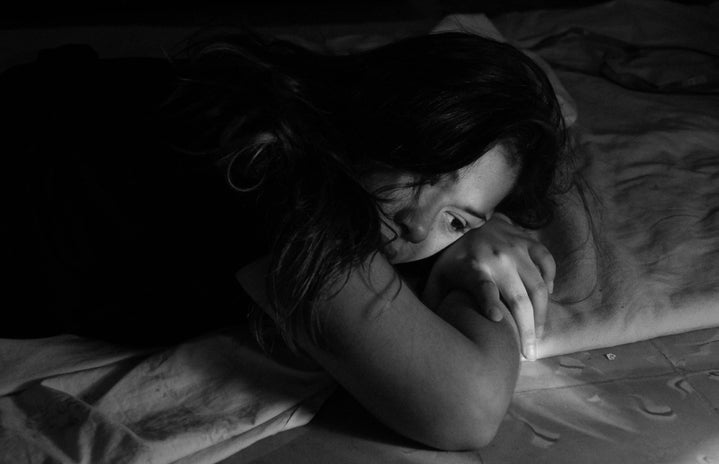Women had few roles in older books besides mother, maiden, bride, and evil doer. A subset of the maiden is the pitiable woman. She is sick either physically, in which case she is fragile or delicate, something to be protected. Or she is mentally sick, in which case she is something to be feared, what will she do next? No one knows, she no longer fits the ideas of how women act, and her choices could be anything from tears to explosive outbursts. This idea of mental illness in women and men was a way to villainize them.
Many books include mentally ill women who give up but there are also a good number where they work through their problems and come out stronger on the other side. There has been an enlightening rise in literature about intersectional experiences with mental illness such as the differences in how men, bipoc, disabled, and gender nonconforming individuals experience mental health strains. Here, I have compiled all the classic books that I have read containing women who struggle with their mental health. These books show that experiences and struggles with mental health aren’t new, our attitudes toward them are what’s new and ever evolving.
1. Hamlet
Starting in the 15th century, Hamlet by William Shakespeare is a perfect comparison of mental illness and how it was perceived in men versus women. Ophelia, Hamlet’s former girlfriend, goes “mad” after her father is killed by Hamlet. Shakespeare illustrates her “madness” by showing how she runs through the castle singing repetitive songs talking about death and sadness and her own misery; it culminates with her drowning herself. When Hamlet “goes mad,” the characters seek to help him and talk to him, they see him as still having a chance for recuperation. For Ophelia, they lament the tragedy of her condition, there’s no hope for her.
2. Jane Eyre
Jane Eyre by Charlotte Bronte, written in 1847, follows an orphaned girl Jane and her time as a teacher to the niece of Mr. Rochester, the lord of Thornbury. In that time, they fall in love, but horrifying complications arise. Mr. Rochester is already married to a woman named Bertha. Bertha is a Creole woman he married who went “mad.” Similar to the idea in heart of darkness, after moving to a country strange and alien to her, she begins to develop clear signs of mental illness. She exhibits impulsive violence and emotional instability. She of all the women on this list is the most heart-breaking. Instead of seeking help, Mr. Rochester locks her in the attic and has a servant sit on guard making sure she never gets out, like a caged animal.
3. The Yellow Wallpaper
In 1892, Charlotte Perkins Gilman wrote a short story called The Yellow Wallpaper. In it, a woman with postpartum depression is relegated to bed and slowly finds herself obsessed with the wallpaper. At first, she sees it as an eyesore, but, slowly as she begins to feel more and more isolated, she develops a paranoid, frantic, and sinister relationship with the wall. Gilman sent a copy to her doctor, who told her that she wasn’t allowed to have any mental stimulus while she was diagnosed with female hysteria and he used to help treat his future patients. Gilman, when diagnosed, was told that mental stimuli would worsen her condition, but in the end, it was that same mental engagement that enabled her to get better.
4. The Waves
The Waves by Virginia Woolf was published in 1931 and follows an evening of friends reconnecting. Jinny is a well-off socialite with a tendency to contemplate her own place in existence, the meaning of life, and her own ageing. Rhoda is an introvert with a fear of commitment that leads her to the breakdown of her relationship with another character named Louis. She has a deep desire to transcend reality and to not exist, leading her to take her own life. These two show two different forms of depression and the way it affects people. Jinny experiences depression without a desire to not exist, she doesn’t understand life and finds meaninglessness everywhere, so why try? Rhoda on the other hand just desires release from the bonds and ties she has, as she doesn’t see the point of life and desires a peaceful rest.
5. The Bell Jar
The Bell Jar by Sylvia Plath is a classic of mentally ill heroines. In this 1950s novel, Esther, a young adult with progressively worsening mental health. After taking an attempt at her life, she is instituted in a psych ward where she is dismayed and upset with her circumstance. She makes gradual progress before regressing and then progressing again. The existence of her mental illness hangs over her, looming. In the end it becomes a part of who she is, something she must learn to live with.
6. She’s Come Undone
She’s Come Undone by Wally Lamb takes place in the 1950s and follows Dolores’s struggle with body image, self-esteem, and depression. Dolores experiences a traumatic event at a young age, which leaves her scared, lonely, and frightened. After gaining over 100 pounds, she also experiences bullying, and self-loathing which worsens her mental health. The book is a chronicle of her experience with her body, her past, and her family. In the end, through therapy, introspection, and kind friends, she’s able to create a beautiful and happy life for herself. Eventually, she is able to look back and find beauty in herself, and all the imperfect people she was before.
These books don’t come close to chronicling the treatment of women’s mental health in books. But my goal was not to provide a chronicle of the history, rather to spark conversation. Books about mental illness create channels of conversation, and the more the issue is discussed the more understood it will be. A common theme in all these books was an overwhelming feeling of isolation. When reading books about characters who struggle with mental health, there is one clear takeaway: we must strive to be people that we wish the characters had, in their time of need. If we can be who our favourite characters need, then we can make the world a better place for those around us, and hopefully make them feel seen and appreciated.


